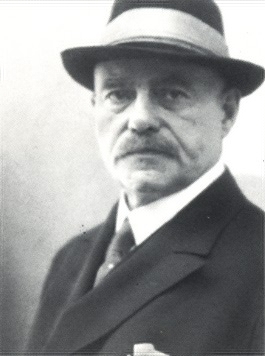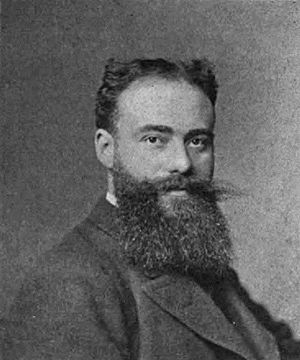Hermann Sudermann facts for kids
Quick facts for kids
Hermann Sudermann
|
|
|---|---|
 |
|
| Born | 30 September 1857 Matzicken, Prussia |
| Died | 21 November 1928 (aged 71) Berlin, Germany |
| Occupation | Dramatist and Novelist |
| Nationality | German |
| Notable works | Heimat (play) Frau Sorge (novel) |
| Spouse | Clara Lauckner (1861-1924) |
| Signature | |
Hermann Sudermann (born September 30, 1857 – died November 21, 1928) was a famous German writer. He wrote many plays and novels. His stories often explored the challenges people faced in his time.
Contents
The Life of Hermann Sudermann
Early Years and Education
Hermann Sudermann was born in a small village called Matzicken. This area was part of Prussia, which is now in Lithuania. His family were Mennonites, a Christian group.
His father owned a small brewery. Hermann first went to a Realschule (a type of high school) in Elbing. He lived with relatives there. When he was 14, his family faced financial difficulties. He then became an apprentice to a chemist.
However, Hermann was determined to continue his studies. He later attended a Realgymnasium (another type of high school) in Tilsit. After that, he studied philosophy and history at Königsberg University.
Becoming a Writer
To finish his education, Sudermann moved to Berlin. He worked as a tutor for different families. One family was that of the author Hans Hopfen. Later, he became a journalist. For a short time, he was a co-editor for a newspaper.
He then decided to focus on writing fiction. His first collection of short stories was called Im Zwielicht (meaning "At Twilight"). He also wrote novels like Frau Sorge ("Dame Care").
But it was his first play, Die Ehre ("Honour"), that made him famous. This play was very important for German theater. It showed a new way of writing for the stage.
In 1891, he married Clara Lauckner. She was a novelist too. They lived in Berlin and had a daughter named Hede.
Growing Fame and Later Works
Another very successful play by Sudermann was Heimat (1893). It was translated into English as Magda. This play was performed by famous actresses around the world. It talked about an artist's right to live freely.
Sudermann's works were also popular in Japan. Many of his plays were turned into films. Over 30 movies were based on his stories in the 20th century.
He also wrote more novels, like Es War ("It Was"). In 1902, he moved to a large mansion. He used his wealth to collect art and travel to many countries.
During World War I, Sudermann supported his country. He even received an Iron Cross for his efforts to promote art. After the war, he helped create a group for artists.
Some of his important later works include Litauische Geschichten ("Lithuanian Stories"). This book showed a realistic picture of his homeland. He also wrote an autobiography in 1922.
His last major novel was Die Frau des Steffen Tromholt (1927). It was partly based on his own life. This book was also made into a movie. Hermann Sudermann passed away in Berlin in 1928 at the age of 71.
Lasting Legacy
After World War II, Sudermann's plays and novels were not as popular. However, some of his stories are still remembered today. Several famous silent films were based on his works.
For example, the movie Sunrise: A Song of Two Humans (1927) was based on his short story Die Reise nach Tilsit. Other films like The Song of Songs and Flesh and the Devil were also inspired by his novels.
Major Works
Here are some of Hermann Sudermann's most well-known works:
- Im Zwielicht: Zwanglose Geschichten ("At Twilight", short stories, 1886)
- Frau Sorge ("Dame Care", novel, 1887)
- Die Ehre ("Honour", play, 1889)
- Der Katzensteg ("Cats' Bridge", novel, 1890)
- Heimat ("Homeland", play, 1893)
- Es War ("It Was", novel, 1894)
- Johannisfeuer (Fires of St. John, play, 1900)
- Das hohe Lied ("The Song of Songs", novel, 1908)
- Litauische Geschichten ("Lithuanian Stories", short stories, 1917)
- Das Bilderbuch meiner Jugend: Autobiographie ("The Picture Book of my Youth", autobiography, 1922)
- Die Frau des Steffen Tromholt ("The Wife of Steffen Tromholt", novel, 1927)
See also
 In Spanish: Hermann Sudermann para niños
In Spanish: Hermann Sudermann para niños
 | William L. Dawson |
 | W. E. B. Du Bois |
 | Harry Belafonte |


